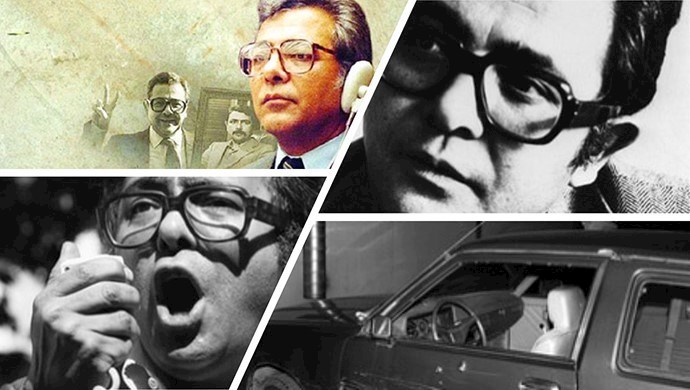Analysis by PMOI/MEK
Iran, September 30, 2021—After a 15-month legal struggle, the Iranian Resistance succeeded in preventing the dossier of Kazem Rajavi, a prominent Iranian human rights advocate assassinated by the Iranian regime in Geneva, to be closed under a 30-year limit statute.
The Swiss Federal Criminal Court has ordered the case, which was previously being investigated as a “murder,” to be filed as “genocide” and “crime against humanity.”
Dr. Rajavi, the older brother of the Iranian Resistance Leader Massoud Rajavi, was a renowned jurist and Iran’s first ambassador to the United Nations in Geneva after the 1979 revolution. He was the representative of the National Council of Resistance of Iran (NCRI) in Switzerland a respected human rights defender. Dr. Rajavi was assassinated by a squad of 13 Iranian regime terrorists with diplomatic visas on April 24, 1990, near his home in Geneva.
The direct consequence of the ruling will be the extension of the arrest mandates for the 13 assassins, whose identities are known, and former intelligence minister Ali Fallahian, who orchestrated the plot.
But the implications could extend further and encompass other cases among the list of endless crimes that the Iranian regime has committed against dissidents in the past decades.
Mrs. Maryam Rajavi, the President-elect of the NCRI, described the ruling as “a historic turning point, affirming that genocide and crime against humanity should at no time and not anywhere be ignored based on the statute of limitations.”
Genocide and crimes against humanity should never and nowhere be covered up and forgotten over time. European governments and the U.S. must recognize the massacre of political prisoners in #Iran as genocide and a crime against humanity. #NoImpunity4Mullahs
— Maryam Rajavi (@Maryam_Rajavi) September 29, 2021
The reason that this murder case is being recognized as “genocide” is that it happened against the background of a widespread campaign by the Iranian regime to annihilate all members and supporters of the People’s Mojahedin Organization of Iran (PMOI/MEK). Less than two years before Dr. Rajavi’s assassination, the regime’s supreme leader Ruhollah Khomeini had issued a religious decree (fatwa) which explicitly stated that anyone who has any affiliation with the MEK is an enemy of God and should be executed. Based on this fatwa, the regime carried out a mass purge of Iran’s prison in the summer of 1988, executing more than 30,000 prisoners in the span of a few months. Under the same order, the regime carried out a series of assassinations and terrorist attacks against MEK members in different countries.
In an interview with Tribune de Geneve, Behzad Naziri, a former political prisoner and an assistant of the Dr. Rajavi, “This decision is very important, because it makes the link between the wave of political assassinations of Iranian opponents abroad, including that of Kazem Rajavi, and the massacre of 30,000 political prisoners, members of the People's Mujahedin, in 1988, described as a "crime against humanity" by a UN special rapporteur.”
There are several ways this ruling can help address the Iranian regime’s human rights abuses and terrorism in a broader context.
“The UN Human Rights Council in Geneva can set up an international commission of inquiry,” Naziri said. “Another possibility, although more difficult politically, is the constitution of a specific Criminal Court as for Rwanda or the former Yugoslavia by the UN Security Council.”
While Iran’s regime will use its political cloud to try to veto such a decision, the veto will be difficult the current Iranian president, Ebrahim Raisi, was one of the members of the "death commission," a group of judges that were responsible for carrying out Khomeini’s fatwa in Iran’s prisons. The death commission summoned political prisoners and tried them in kangaroo courts that lasted no longer than a few minutes. Mostafa Pourmohammadi, a former justice minister, was another member of the commission.
What makes this ruling even more significant that it has come at the same time that Hamid Nouri, a former prison guard in the notorious Gohardasht prison, is being tried in a Swedish court for his role in torturing prisoners and the 1988 massacre. That case too is bringing international attention to the heinous crimes committed by the Iranian regime.
And earlier this year, another court in Belgium sentenced Assadollah Assadi, a Vienna-based Iranian diplomat, to 20 years in prison for plotting the bombing of a massive Iranian Resistance rally in 2018.
For decades, the Iranian regime has made terrorism and human rights abuses two key pillars of its domestic and foreign policy. And for decades, it has enjoyed impunity at home and on the international front. But now, thanks to the tireless efforts of the Iranian Resistance, the regime is facing the consequences of decades of crimes. And as these key events join, it can create the grounds for a watershed moment in the history of a regime that has only maintained its hold on power through bloodshed.





